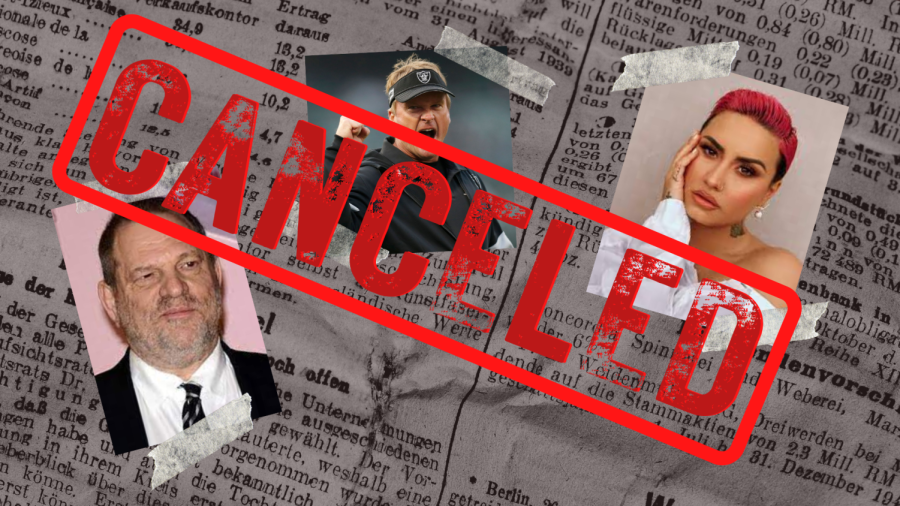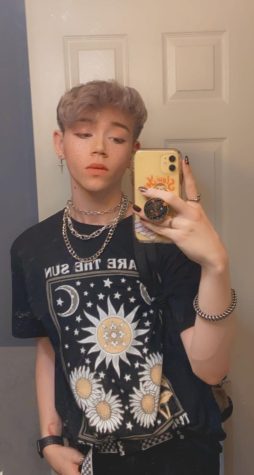Accountability Is the Latest Trend
People of high influence expect their behavior to go unchecked but in today’s world of synthetic accountability, are they really held responsible?
December 12, 2022
Welcome to the twenty-first century! The air is filled with the scent of overpriced coffee and bath and body works candles. If you look around, you will notice everyone seems to be playing a character. Everyone puts up a façade to mask their insecurities, shortcomings, and shameful attributes. You may also observe the intense weight that social media puts on society nowadays. Every advertisement, feature film, and television show now showcases a new influencer, content creator, or social media star. This is due to the grasp that influencers hold on today’s media-consuming population. With every TikTok, tweet, and face-tuned Instagram post, today’s impressionable youth fall enthralled by the damaging trends and fads that are perpetuated by these people of high influence. Another prevalent variable in today’s society is the idea of social justice. As you may know, there has been an uproar calling for social reform and equality in recent years. Movements like “Black Lives Matter” and “Stop Asian Hate” center around improving equality for people of differing races. There is also a current push for bodily autonomy among women. An article from Gale Opposing viewpoints, a scholarly database, titled “Social Justice” states that social justice is “founded on the belief that communities that respect the dignity and rights of all people can be achieved through shared responsibility for the distribution of socioeconomic advantages and disadvantages”.
With this new inclination to be socially and politically correct, many of today’s social media users have begun holding influencers accountable. This system of accountability has earned the name, “Cancel Culture”, due to its harsh and swift nature, reminiscent of the abrupt ending of production on a canceled television program. The site, Gale Opposing viewpoints, features an article titled “Cancel Culture”, which describes canceling as a form of group shaming, often social media–based, usually targeted at celebrities and other notable public figures, or people in positions of authority. The article goes on to describe the nature of canceling as a whole. In recent years, many people have begun questioning the effectiveness and integrity of boycotting content centered around a specific person. Arguments against it state that canceling doesn’t institute a motivation to do better but instead motivates people of influence to work harder to not let their problematic actions show. Many also state that canceling can go too far. Many influencers have spoken up saying that the backlash they have faced is excessive and far too aggressive. The idea of holding people of influence accountable for their actions, though not negative in itself, has led to the over-punishing and social shunning known as cancel culture, which needs to be addressed and replaced with a less overpowered and problematic system.
There are countless examples of canceling in recent years. Instances of which can range quite widely in severity and subject matter. Some cancellations of celebrities stem from feuds between public figures or petty drama from mediocre scandals while others relate to instances of bigotry, abuse, and even sexual harassment or assault. Needless to say, these instances of misconduct, especially the more severe cases, are anything but victimless. For example, over 80 women came forward exposing famed director, Harvey Weinstein for his acts of sexual harassment, abuse, and assault. Of course, Weinstein denies these allegations but there were numerous victims seeking justice. An article titled “Cancel Culture is a Cop-Out to Victims” expresses the idea that most cases of canceling don’t effectively punish their targets. “We really have been talking about outrage for a few months. Some people might boycott a particular entertainer. They might lose one job. But they come back so fast,” the article states that targets of canceling may face a slap on the wrist for their actions but they don’t lose much in the grand scheme of things. The article goes on to say “It’s really difficult to find an example of someone whose life was ruined, even if they deserved consequences for their actions. We mostly see injustice.” Something isn’t working if the system meant to bring people of high influence to justice results in the opposite. What makes it worse is the fact that most people have noticed the flaws in this system. A recent study from Harvard University found that 54% of Americans view cancel culture as a threat to American freedoms and a study from The Hill states that 69% of Americans believe that cancel culture unfairly punishes people.
It’s interesting how canceling is known to over-punish people for actions that may not be truly problematic, but also under-punish people who truly deserve to pay for their actions. This imbalance of accountability is due to a similar and just as problematic system known as “ OK Culture”. An article from Gale Opposing Viewpoints titled “ Cancel Culture Isn’t The Problem. OK, Culture Is’ ‘described an incident surrounding National football league head coach, Jon Gruden. Gruden’s emails featuring racist homophobic and sexist remarks surfaced and he became a target of scrutiny and backlash from the media and the public. The article states “The coach, who is white, wrote while he was an analyst at ESPN that a Black union leader had lips like rubber tires. More revelations suggested Gruden wasn’t the only one in the leadership ranks of the N.F.L. engaging in virulent casual racism, as other emails emerged showing a senior official joking about Native Americans and mocking diversity.” One may think that all can agree that this simply was not appropriate for work-based emails but many jumped to Gruden’s defense. Eventually, Gruden resigned from his position but this doesn’t mean in any way he is a victim. Due to the supposed “OK Culture” that allowed Gruden, his coworkers, and countless other people of high influence to speak their problematic and hateful rhetoric, many people who genuinely deserve to lose their jobs, positions, and influence get to go on with their lives and act however they please.
As previously mentioned, while many people of high status get off with a simple slap on the wrist, many undeserving people find themselves facing extreme hate and backlash over simple and oftentimes petty issues. For example, on April 18th, 2021, famed singer, actor, philanthropist, and LGBTQ advocate, Demi Lovato scrutinized a Los Angeles sweet shop in a social media post. The non-binary pop star called the shop out for promoting diet culture and targeting plus-sized customers. The products that Lovato found offensive were labeled as “guilt-free” which could be seen as shaming toward plus-sized people. The shop claimed they didn’t see it as shaming and that those specific products were for people who had health restrictions. Lovato soon retracted the statement and the feud fizzled out but not before the shop saw a major decline in revenue due to the A-list level social media backlash they faced. The shop didn’t deserve the level of criticism they faced but due to the reckless nature of social media based canceling, they saw more hate than one can imagine.
Simply put, Cancel Culture needs to be done away with. It overly punishes undeserving people while allowing those with enough power to slip through the cracks and continue their problematic actions. While doing so, many victims of these people of high status become silenced and oppressed even more than they originally were by their previous abusers. With all of this said, we can’t just eliminate efforts to hold people accountable. We must reform the system of canceling to a new course of action that uplifts victims, strips abusers of their power, and promotes healthy, inclusive mindsets for our media and public society to implement into daily life.


